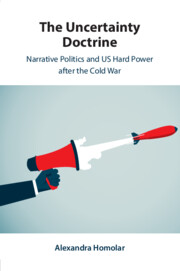‘A deeply impressive and sustained disquisition on one of the most vexed and contentious areas of study: US foreign policy since the end of the cold war. This is a work brimming with ideas and arguments: it deserves a large audience and to become a seminal scholarly text.'
Timothy J. Lynch - Professor of American Politics, the University of Melbourne
'A superb book that makes a genuine and highly original contribution to the field of US foreign policy studies. It provides a fascinating challenge to what we think we know about the post-Cold War era and is an essential read for anyone interested in the topic.'
Michelle Bentley - Royal Holloway, University of London
'After the Cold War, the ‘peace dividend’ never materialized. The reason, according to Alexandra Homolar in this fascinating new book, was not 9/11 and the resulting War on Terror. A decade before, she argues, a narrative of ’uncertainty’ had come to the fore. … This is a careful and impressive study of how narrative politics works to cast plausible alternatives to the margins.'
Ronald R. Krebs - Professor of Political Science, University of Minnesota
'A meticulously researched study of how security policy ideas emerge into strategic visions and frameworks for military planning. This is a must-read book on how, despite permissive conditions, political and intellectual actors and entrepreneurs can ensure that national security strategies and expenditures remain largely undisturbed.'
Inderjeet Parmar - City, University of London
‘The book offers theoretical and methodological contributions not just to the security narratives space but also to our understanding of how political actors respond to and capitalize on political events … the book extends our understanding of uncertainty’s uses in the making of security strategy.’
Sophie Kaldor
Source: International Affairs



